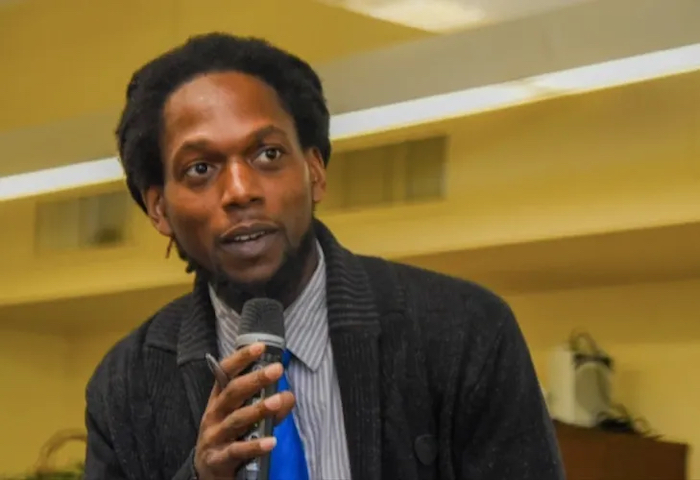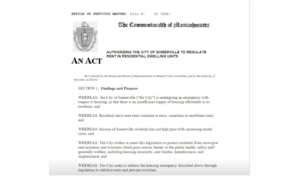City council candidate turned in a late questionnaire, triggering a series of events that led to a debate on equity in Somerville politics
(Somerville Wire) – The decision to not allow Ward 2 Somerville City Council candidate Stephenson Aman to participate in an Our Revolution Somerville candidate forum, held on June 18, and to block him from endorsement from ORS has been the subject of lengthy debate. When Aman missed the deadline to submit his questionnaire, organizers ruled that he would lose the chance to join the forum or to be endorsed. In the days that followed the onset of the controversy, some candidates withdrew from the ORS endorsement process, while ORS grappled with the process of apologizing and attempting to rectify the problem.
The original April 1 deadline to submit a questionnaire to ORS had already been moved back multiple times to accommodate other candidates, and when Aman was unable to meet the new June 7 deadline, ORS granted him an extension until June 11. Aman said that he did not have direct access to a laptop and had to scramble to use a friend’s to fill out the questionnaire, while he was also busy getting signatures. On June 16, Aman’s friend and political advisor Diane Asadorian Masters, who is not being paid, submitted the questionnaire to ORS on Aman’s behalf, and on June 17, ORS replied to Aman, asking him to verify his connection to Masters and explaining that he would not be allowed to participate in the forum. Aman had missed the deadline, the email explained.
“It was a gut punch,” Aman said. “It really hurt. Usually, when you hear stories like this, it happened in the South—Texas, or Alabama, or Florida. … This happened right in my backyard; it happened to me. That really hurt, because of all the service I’ve done for my community.” He added, “At the end of the day, I would have loved to have been part of the forum. And if the forum truly was to get candidates to speak on topics and issues that they feel passionate about and disconnected it from the questionnaire, that would have been awesome. But it is what it is.”
Aman, the son of Haitian immigrants and a person of color, is a disability advocate and youth sports coach. He was raised in a single-parent household and was eventually placed in the foster care system. During his time as a student at the University of Massachusetts Amherst, he was involved in a traffic accident in Boston and had to use a wheelchair, though he later recovered.
Somerville political figures responded to Aman’s blocking from the forum in a series of statements. A group of Somerville City Council candidates of color released a statement, signed by Tracey Leah Pratt, Beatriz Gomez Mouakad, Judy Pineda Neufeld, and Aman. In this letter, they asked ORS to suspend its political activities until “it has gone through a formal process to address its shortcoming.” Councilor and mayoral candidate Katjana Ballantyne called upon all candidates for office in Somerville to withdraw from their involvement in ORS.
“These actions taken by ORS leadership, to silence Stephenson, cannot be reconciled with my own vision of Somerville as an inclusive, equitable city where we can all thrive together, without exception,” Ballantyne wrote. She added, “I believe that it is appropriate to request that ORS undertake a transparent process, to review their systems and structures to ensure that they are consistent with the stated mission of ORS and that they are consistent with our shared values.”
On social media, it has been disputed whether the questionnaire that Aman submitted was complete, as it was missing responses to over a third of the questions. Other city council candidates, like Jake Wilson, said that they believed this was acceptable, with Wilson adding that in his own questionnaire, he answered between 2/3 to 3/4 of the questions. ORS urged him to submit his questionnaire anyway.
“It was extensive. It was a lot of stuff that, honestly, I question whether they were even Somerville issues,” Wilson said. “I did prioritize, in terms of what I thought was important to answer. They asked about BDS (Boycott, Divestment, Sanctions), and I view BDS as a really divisive issue. I don’t have strong thoughts either way on it.” He added, “They told me that [leaving some answers blank] was totally fine. I believe it was Nate [Clauser, of the ORS Steering Committee], whose answer to that was, ‘We would prefer an incomplete questionnaire over not getting one.’”
Other candidates, like Justin Klekota, left pages of the questionnaire blank, instead writing responses in paragraph form, which ORS then copied into the appropriate sections of the document. They asked him specifically whether it was his intention to respond in this manner or whether his text had been truncated. Asked how Aman’s questionnaire compared to these other candidates’, in terms of thoroughness, representatives from ORS said in an interview that it was not the incompleteness of his questionnaire that barred him from participation, but rather the timeliness.
Wilson, in a statement, wrote that he believed ORS had set a precedent of trying to accommodate many other candidates but would not allow flexibility for Aman. After Wilson missed an initial deadline of April 1, he said that he received a phone call from ORS telling him that the deadline would be extended for all candidates. Clauser, the person who called, said Wilson, acknowledged that another candidate, Virginia Hussey, had requested the deadline be moved to April 4 (incidentally, Hussey did not end up submitting a questionnaire to be published on ORS’ site). Aman said that when he missed his deadline of June 11, he did not receive an email or phone call and had to reach out to ORS.
Aman’s predicament was complicated by the fact that Masters submitted his questionnaire on his behalf. Masters submitted an email that stated the following:
“I am sending the attachment on behalf of Stephenson Aman. He has had computer issues.”
In a statement that ORS released, they explained that, “ORS received an email containing a questionnaire from an individual who did not clearly identify their connection to Mr. Aman’s campaign.” It is common practice, said Klekota, for political figures to have somebody else, such as a campaign manager proofread or submit questionnaires.
Following June 16, the day of Masters’ email, ORS responded on June 17, asking Aman to verify his connection to Masters and also telling him that he would be unable to participate in the forum. The reason why they even bothered to ask for verification, said Melinda Green of ORS’ Communications Team, is because each questionnaire submitted to ORS gets published, regardless of when it was turned in. ORS did post Aman’s questionnaire, even though he was ineligible to participate in the forum. An ORS representative said that Masters had not specified her role in Aman’s campaign; hence, the organization questioned Aman over email.
The decision to not allow Aman to participate in the forum or endorsement process came from a vote of the ORS Steering Committee. The results were 7-1 against Aman, with two members abstaining. According to an anonymous ORS member, ORS had a process with deadlines that it wanted to adhere to in a fair manner, and ORS recognizes that Aman had disadvantages that it could have been more understanding of. The member also acknowledged that in the way that ORS reached out to candidates, there may have been unintentional inconsistencies. This person apologized for the communication gaps, adding that the process had some “flaws.”
“I think probably there were inconsistencies because we basically had rolling information, and so when we saw that people had pulled papers and we had their email address, we would try to contact them to invite them into the process,” the member said. “When we saw that there was a public record that somebody had filed with OFPC or they had done something to demonstrate that they were running, we contacted them. I think we saw that Stephenson had pulled papers for at large, and we contacted him. … I think there probably were inconsistencies, and they weren’t intentional. They were because, some people, we had email addresses; some people, we had phone numbers.”
Regarding whether other candidates had somebody else submit their questionnaires on their behalf, the source said that there were a few other cases. Mayoral candidate Mary Cassesso’s questionnaire was submitted by Marcela Castillo, who identified herself as Cassesso’s field director. Ballantyne’s questionnaire was submitted by Josh Troop, who identified himself as Ballantyne’s campaign manager. ORS did not comment on whether they responded to these individuals in a different way than they did with Aman and Masters or if they questioned the relationships between the candidates and their staff.
ORS’ Steering Committee submitted an apology letter to Pratt, Gomez Mouakad, Neufeld, and Aman, where it outlined changes to future endorsement processes. These changes included having future questionnaire deadlines no earlier than the date filing papers are due to the city and following up with candidates via a number of different methods. The source explained that planning for the forum had been a “frantic” process, while Green emphasized that ORS is a volunteer organization, with many members having families and full-time jobs.
“This was taking a lot of time for people to plan, and I don’t think it was intentional to try to exclude him in that way,” the source said. “I think people were really just going flat out trying to plan this forum. We had to get everybody’s questionnaires, try to format them in a uniform way, get them on the website in a timely manner. There were just a lot of things. I don’t think anybody intentionally tried to say, ‘This is our process. If they don’t get it by this deadline, then we give them a phone call.’ Maybe with some people we did that, and some people we didn’t. If that’s the case, it’s not fair, and I agree, it’s not fair. And so, I apologize.”
Some community members have said that they believe race played a role in the way that the situation played out, with the Welcome Project’s Ben Echevarria publishing an critical opinion piece in the Somerville Times titled “Our Revolution perpetuates systemic racism”.
“The subtlety of systemic racism can be difficult to spot for the uninformed voter, but glaring when given context,” wrote Echevarria. “DSA Boston are running three At Large candidates and three candidates in wards two, five and seven. All but one of these candidates are white. Their main opponents are all members of the BIPOC community.”
Councilor Matt McLaughlin, meanwhile, declined endorsement from ORS, describing its actions and decisions as having been influenced by bias. During the forum, he wrote in a Facebook post, candidates of color “were the victims of blatantly biased questions meant to humiliate them and promote members of the Democratic Socialists of America (DSA) Boston chapter, most of whom are white.” Meanwhile, non-DSA candidates of color were accused of ignorance, and McLaughlin added that he does not believe the questions were intended to be racist but that ORS showed its favoritism of white DSA candidates over non-white opponents. McLaughlin—an ORS founder—traced this behavior to what he called a recent direction ORS has taken, through which the organization no longer serves underrepresented people.
“What started as a unifying campaign to elect candidates truly committed to affordable housing has become a movement that demands absolute purity on a litany of issues that only a narrow, privileged group of people could possibly uphold or identify with,” wrote McLaughlin. “The movement’s failure to organize low income neighborhoods after years of activism makes the exclusion of Stephenson all the more problematic.”
City council candidate Willie Burnley Jr., who is a person of color and a DSA member, said that he did not believe he was treated differently by ORS based on race, stating that he turned his questionnaire in before the April 1 deadline and that he tried to be as detailed and thorough as possible. When it came to the conversation about racial justice surrounding this case, Burnley said that he felt his voice had not been heard.
“I felt very excluded from this conversation that focused a lot on unfair treatment of candidates of color,” Burnley said. “I personally don’t believe that there was unfair treatment, aside from very painful mistakes made around name pronunciations or name exclusions.” He added, “There were a lot of statements that were going around that implied that all the candidates of color felt a certain way in this race or were taking a certain position. That’s just fundamentally not true. Before this initial letter came out, charging that ORS [had an] implicitly racist process, I was never consulted on that. I was never able to say where they could be better or what they did wrong. I found that exclusion to be purposeful, political, and painful for me. I have actually spent all of my adult life fighting on issues of racial justice… I think that it’s really important in these conversations that we do not reduce people of color, which is an extremely broad category that represents most of the world, to a monolith.”
ORS said that it is moving forward by reaching out to candidates to apologize and progressing on conversations. In the letter addressed to four candidates of color, ORS acknowledged that it is an “overwhelmingly white and white-led organization, though we do not wish to discount the contributions of our members of color.” The group said that it is committed to working as an inclusive and anti-racist body.
“I just want us to go forward and improve on these processes and take the criticism,” Green said. “I don’t just want us to get past this. I want us to take this very seriously… and hopefully restructure our organization… It’s [because of] the people who are most active, that [it appears that] only a select few are the ones making a decision for a body that touts that membership makes all these decisions, and I am just always interested in improving those processes.”
All Somerville Wire articles may be republished by community news outlets free of charge with permission and by larger commercial news outlets for a fee. Republication requests and all other inquiries should be directed to somervillewire@binjonline.org.
SUBSCRIBE TO THE FREE SOMERVILLE WIRE EMAIL NEWSLETTER: https://eepurl.com/hpBYPv
Shira Laucharoen is assistant director of the Boston Institute for Nonprofit Journalism and assistant editor and staff reporter of the Somerville Wire.





